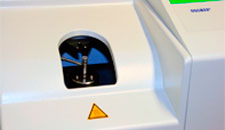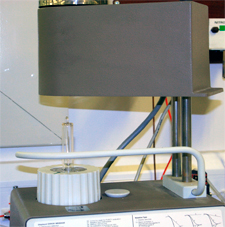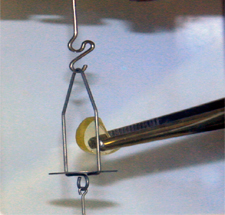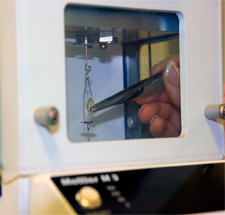Thermal Analysis
Introduction
For characterisation of solids and liquids, including polymers and pharmaceuticals. The physical properties investigated include weight loss, melting and boiling point, glass transition, crystallinity, polymorphism, degradation processes, thermal expansion, thermal stability and specific heat capacity.
Applications
- Characterisation of pharmaceutical compounds
- Identification of polymorphism
- Glass transition temperature of polymers
- Thermal stability checks
- Determination of enthalpy of decomposition
Instrumentation
- Differential scanning calorimetry (DSC) - Mettler DSC 25
- Thermomechanical Analysis (TMA) - Mettler TMA
- Thermogravimatric Analysis (TGA) - Perkin Elmer TGA 7
- Thermal Microscope including video facilities
Differential scanning calorimetry (DSC) is widely-used to determine the thermochemical and thermophysical properties of unknown mixtures or poorly characterized phases. It is also used to carry out studies on known materials and can be useful in the determination and analysis of parameters such as melting, glass transition and polymorphism. The calorimeter measures heat flow into (endothermic) or out of (exothermic) a sample undergoing a phase change, as well as heat capacity of a sample.


Examples of transitions are: melting, recrystallization, decomposition, out-gassing, polymorphism or a change in heat capacity. DSC also measures a transition onset temperature, the temperature at maximum reaction, and the ending temperature. DSC is useful to monitor different samples of the same material to assess their similarities or differences. Measurement of thermal properties can normally be carried out from minus 50° to 600°.
Applications
- Characterisation of the crystallisation events of a material (e.g. Glass Transition, melting point)
- Evaluation of drug and polymer impurities
- Studying curing processes, allowing the fine tuning of polymer properties.

Applications
- Measure changes in the physical dimensions (length or volume) of a sample as a function of temperature and/or time.
- Determination of thermal expansion coefficients and the glass transition temperature of polymer or composite materials


Thermogravimetric Analysis (TGA) is a thermal analysis technique used to measure changes in the weight (mass) of a sample as a function of temperature and/or time. Its principal uses include measurement of a material's thermal stability and composition. TGA instruments are routinely used in all phases of research, quality control and production operations.
Applications
- Characterisation of pharmaceutical and polymer compounds (e.g. polymer degradation, Glass transition)
- Residual solvent levels
- Absorbed moisture content
- Characterisation of composites
- Amount of inorganic (noncombustible) filler in polymer or composite material compositions
If the service you require is not listed on this web site, please contact us, we will be happy to help you.
Thermal Analysis Pricing
| Thermal Technique | Price (£) |
| Differential Scanning Calorimetry | 75 |
| Thermogravimetric Analysis | 75 |
| Thermomechanical Analysis | 80 |
| Thermal Microscopy | from £80 |